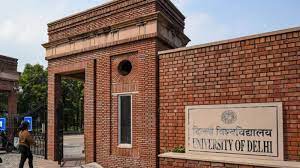Protests erupt as Delhi University raises PhD programme fees by 1,100%
Kenfra Research2023-11-07T15:55:17+05:30Protests erupt as Delhi University raises PhD programme fees by 1,100%- Kenfra
University of Delhi:
Delhi University, officially known as the University of Delhi, is one of the most prestigious and well-known universities in India. It is a public central university located in New Delhi, the capital city of India. Delhi University was established in 1922 and has since grown to become a leading institution of higher education in the country.
Here are some key features and information about Delhi University:
- Campuses: Delhi University has several campuses and colleges spread across the city of Delhi. These colleges are both undergraduate and postgraduate institutions that offer a wide range of academic programs.
Academic Programs: The university offers undergraduate, postgraduate, and doctoral programs in a diverse range of disciplines, including humanities, sciences, social sciences, commerce, engineering, law, and medicine. It is renowned for its academic excellence and research opportunities.
Reputation: Delhi University is known for its high academic standards and has consistently been ranked among the top universities in India. It has a strong reputation for its faculty, research contributions, and the success of its alumni.
Admissions: Admissions to Delhi University are highly competitive, especially for undergraduate courses. The university conducts an annual admission process for various programs, and prospective students are required to meet specific eligibility criteria and merit-based selection.
Diversity: The university is known for its diverse student body, with students coming from all over India and even from different parts of the world to pursue their education at Delhi University.

6. Media and Public Attention: Protests at a prestigious institution like Delhi University can gain significant media coverage, drawing attention to issues related to education affordability, access, and quality. This can lead to a broader public debate on the state of higher education in the region and the country.
7. Administrative Response: The university administration may need to engage in dialogue with the protesting students and faculty to address their concerns. They might reconsider the fee hike, introduce scholarships or financial aid programs, or provide a clear rationale for the increase.
8. Policy Implications: Protests can influence education policies at the institutional and national levels. Government and regulatory bodies might take notice of the issues raised and consider policy changes to ensure that higher education remains accessible and affordable for all.
Protests erupt as Delhi University raises PhD programme fees by 1,100% :
A hypothetical scenario in which protests erupt as Delhi University raises PhD program fees by 1,100% would likely be a significant and contentious issue within the university and the broader academic community. Here’s an elaboration on the potential consequences and factors that could be involved in such a situation:
Student Outcry: If Delhi University were to increase PhD program fees by 1,100%, this would be a drastic change in the cost of education. Students currently enrolled in PhD programs or those aspiring to pursue a doctorate may find the sudden fee hike to be a severe financial burden. Many students would be unable to afford the increased costs, and they would likely express their discontent through protests and demonstrations.
Inequity and Access Issues: Such a substantial fee increase would likely exacerbate issues of inequity in access to higher education. It may discourage individuals from economically disadvantaged backgrounds from pursuing a PhD. Protests would draw attention to the fact that higher education should be accessible to all, regardless of their financial means.
Calls for Transparency: Students and faculty members may demand transparency from the university administration regarding the reasons for the fee increase. They would want a clear breakdown of how the additional revenue from increased fees would be utilized. Transparency can help address concerns about mismanagement and the allocation of resources.
Political and Media Attention: A fee hike of this magnitude would likely attract significant attention from the media, politicians, and policymakers. Protests and student activism can influence public opinion and force authorities to address the issue. Politicians might get involved, calling for accountability from the university.
Negotiations and Dialogues: In response to the protests, the university administration might initiate dialogues with student representatives and faculty members to address the concerns. Negotiations could focus on finding a more balanced and affordable fee structure or exploring financial aid options for those affected.

6. Potential for Legal Challenges: Students or advocacy groups could explore legal avenues to challenge the fee hike, arguing that it infringes on the right to education or that the increase lacks a valid justification.
7. Impact on Research and Quality of Education: The fee hike could also have unintended consequences on the quality of education and research at the university. It might lead to a decrease in the number of students pursuing PhDs, potentially affecting the university’s academic standing and research output.
8. Global Attention: If the protests and fee hike receive international attention, it could impact the university’s reputation on the global stage. Prospective international students and academic collaborators might reconsider their engagement with the institution.
9. Long-Term Repercussions: The aftermath of such protests and the decision taken by the university could have long-term repercussions on the institution’s relationship with its students, faculty, and the broader academic community.
In summary, a 1,100% increase in PhD program fees at Delhi University would likely spark protests and widespread outrage due to its potential impact on access to higher education, affordability, and transparency. The outcome of such a situation would depend on how the university administration, students, faculty, and other stakeholders engage with the issue and work towards a resolution.








Leave a Reply